Role of Excellence Awards on Business Excellence
Added on 2023-06-08
45 Pages7197 Words451 Views
Running head: ROLE OF EXCELLENCE AWARDS ON BUSINESS EXCELLENCE
ROLE OF EXCELLENCE AWARDS ON BUSINESS EXCELLENCE
Name of Student
Name of University
Author Note
ROLE OF EXCELLENCE AWARDS ON BUSINESS EXCELLENCE
Name of Student
Name of University
Author Note
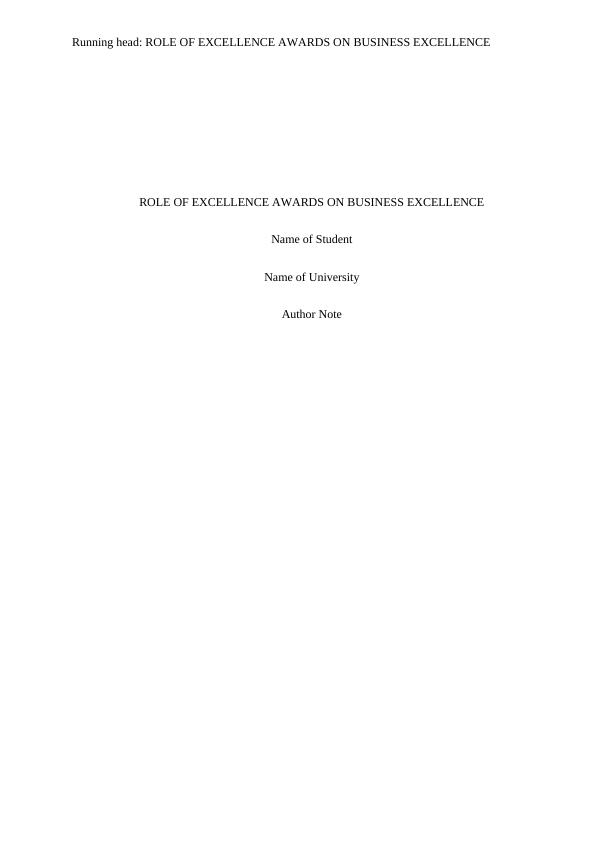
2
ROLE OF EXCELLENCE AWARDS ON BUSINESS EXCELLENCE
1.0 Analysis
Introduction
A survey was conducted on a population of size 30,000. The questionnaire was
designed to target those who were employed in the government sector. The key objective of
the survey was to gather information for a study on how ‘organizational context’ such as
strategy, organizational structure, technology being used and leadership relates to the level of
business excellence being experienced by the organization with respect to the implementation
of excellence awards policy. Due to time and resource constraints, it would have not been
feasible to take into account all of the 30,000 population members. Therefore a sample of 380
individuals was considered as respondents for the survey questionnaire. 284 out of these
individuals were found to have responded to the survey and the current paper discusses the
results of the analysis based on the data collected from the same.
Research Methodology
A survey research method was followed in this case. The questionnaire consisted of a
number of items, including those referring to demographic attributes of the respondents,
followed by a number on items measuring their ratings of their work environment with
respect to organizational context, namely four on leadership, five on strategy of the
organization, four on technology and a four on structure of the organization. Following this
item 24 to item 41 addressed their opinion and perception on the excellence awards policy at
work in their workplace. The final item is a rating of their perception of the level of business
excellence at their workplaces. For the purpose of the analysis, this rating of excellence is the
dependent variable. The independent variables considered are scores measured as medians of
the items addressing strategy, leadership, structure and technology respectively.
ROLE OF EXCELLENCE AWARDS ON BUSINESS EXCELLENCE
1.0 Analysis
Introduction
A survey was conducted on a population of size 30,000. The questionnaire was
designed to target those who were employed in the government sector. The key objective of
the survey was to gather information for a study on how ‘organizational context’ such as
strategy, organizational structure, technology being used and leadership relates to the level of
business excellence being experienced by the organization with respect to the implementation
of excellence awards policy. Due to time and resource constraints, it would have not been
feasible to take into account all of the 30,000 population members. Therefore a sample of 380
individuals was considered as respondents for the survey questionnaire. 284 out of these
individuals were found to have responded to the survey and the current paper discusses the
results of the analysis based on the data collected from the same.
Research Methodology
A survey research method was followed in this case. The questionnaire consisted of a
number of items, including those referring to demographic attributes of the respondents,
followed by a number on items measuring their ratings of their work environment with
respect to organizational context, namely four on leadership, five on strategy of the
organization, four on technology and a four on structure of the organization. Following this
item 24 to item 41 addressed their opinion and perception on the excellence awards policy at
work in their workplace. The final item is a rating of their perception of the level of business
excellence at their workplaces. For the purpose of the analysis, this rating of excellence is the
dependent variable. The independent variables considered are scores measured as medians of
the items addressing strategy, leadership, structure and technology respectively.
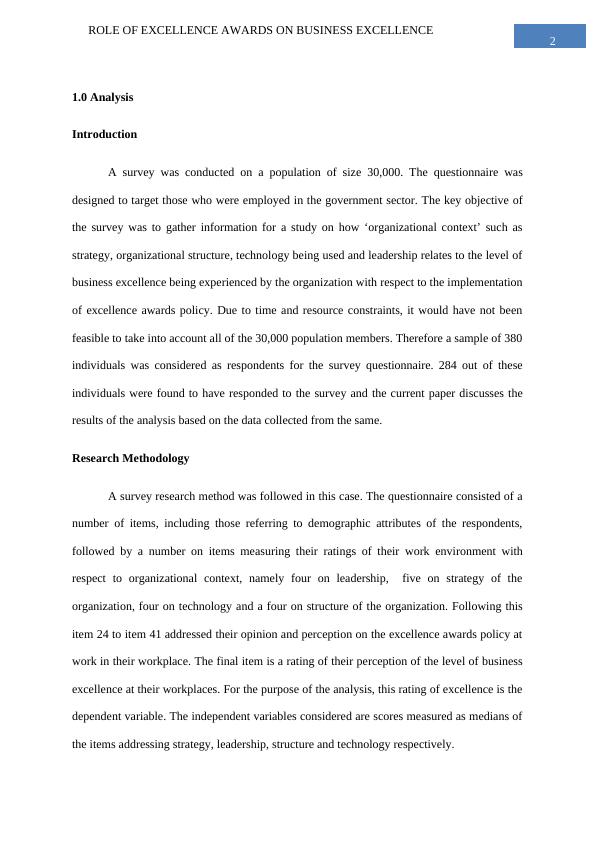
3
ROLE OF EXCELLENCE AWARDS ON BUSINESS EXCELLENCE
Results
1. Construct Validity
The data collected contained 284 observations on six items addressing demographic
factors, such as their gender, age, nationality, educational qualification, job level at the
organization and the length of time that the respondent had been employed there.
Out of the 284 respondents 40.5 percent were found to be female and 59.5 percent
male.
1. Gender
Frequency Percent Valid Percent Cumulative
Percent
Valid
Female 115 40.5 40.5 40.5
Male 169 59.5 59.5 100.0
Total 284 100.0 100.0
Table 1
ROLE OF EXCELLENCE AWARDS ON BUSINESS EXCELLENCE
Results
1. Construct Validity
The data collected contained 284 observations on six items addressing demographic
factors, such as their gender, age, nationality, educational qualification, job level at the
organization and the length of time that the respondent had been employed there.
Out of the 284 respondents 40.5 percent were found to be female and 59.5 percent
male.
1. Gender
Frequency Percent Valid Percent Cumulative
Percent
Valid
Female 115 40.5 40.5 40.5
Male 169 59.5 59.5 100.0
Total 284 100.0 100.0
Table 1
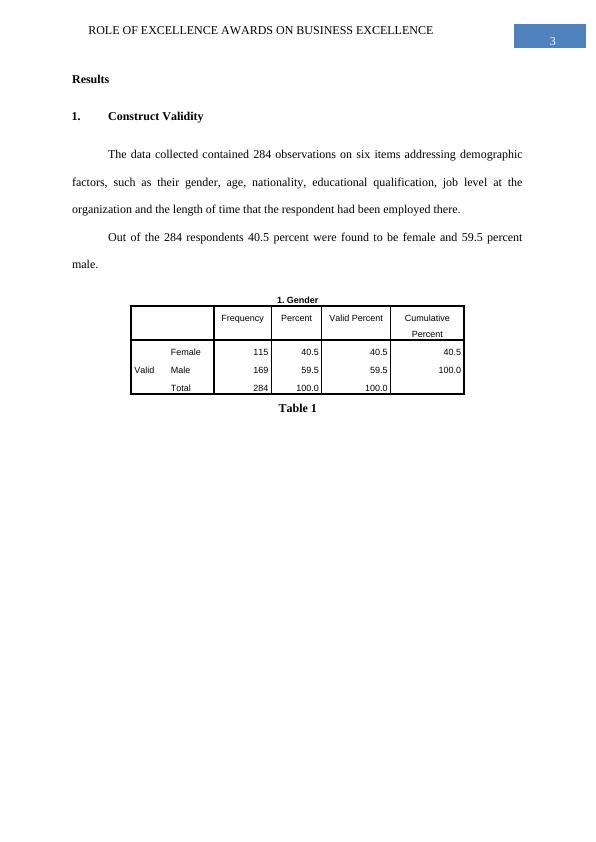
4
ROLE OF EXCELLENCE AWARDS ON BUSINESS EXCELLENCE
Figure 1: Distribution of Gender
Out of all the respondents in the survey 7.7 percent were Egyptians, 0.4% were
French, 8.1 percent were Indians. Iraqi, Lebanese and those from Oman held 0.7 percent
participation percentage each.3.2 percent of the participants were Lebanese. 2.1 percent were
from Sudan, 57.8 percent were from the UAE and those from UK and USA were 2.5 and 8.5
percent respectively. So it is seen that majority of the participants hail from the Middle East.
2. Nationality
Frequency Percent Valid Percent Cumulative
Percent
Valid Egypt 22 7.7 7.7 7.7
France 1 .4 .4 8.1
India 23 8.1 8.1 16.2
Iraq 2 .7 .7 16.9
Jordan 2 .7 .7 17.6
Lebanon 9 3.2 3.2 20.8
ROLE OF EXCELLENCE AWARDS ON BUSINESS EXCELLENCE
Figure 1: Distribution of Gender
Out of all the respondents in the survey 7.7 percent were Egyptians, 0.4% were
French, 8.1 percent were Indians. Iraqi, Lebanese and those from Oman held 0.7 percent
participation percentage each.3.2 percent of the participants were Lebanese. 2.1 percent were
from Sudan, 57.8 percent were from the UAE and those from UK and USA were 2.5 and 8.5
percent respectively. So it is seen that majority of the participants hail from the Middle East.
2. Nationality
Frequency Percent Valid Percent Cumulative
Percent
Valid Egypt 22 7.7 7.7 7.7
France 1 .4 .4 8.1
India 23 8.1 8.1 16.2
Iraq 2 .7 .7 16.9
Jordan 2 .7 .7 17.6
Lebanon 9 3.2 3.2 20.8
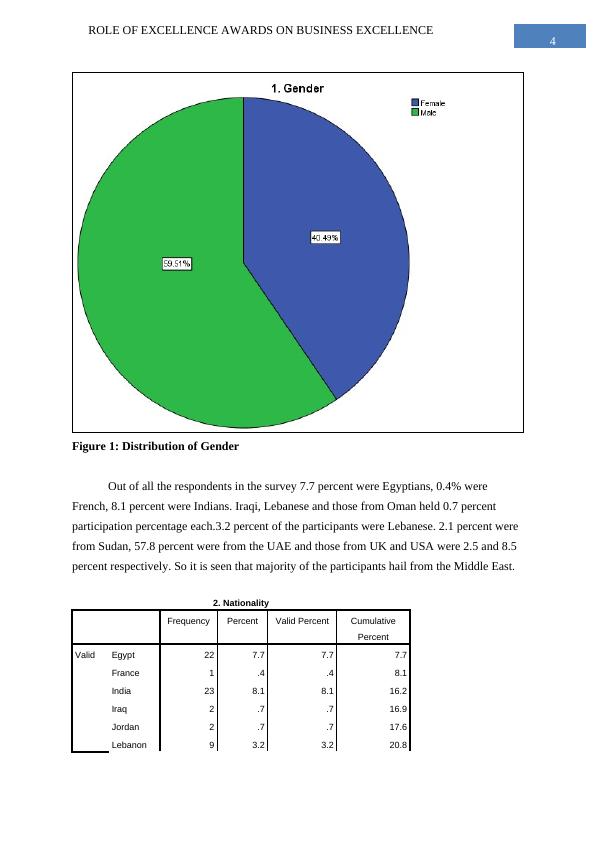
5
ROLE OF EXCELLENCE AWARDS ON BUSINESS EXCELLENCE
Oman 2 .7 .7 21.5
Sudan 6 2.1 2.1 23.6
Syria 22 7.7 7.7 31.3
Uae 3 1.1 1.1 32.4
UAE 161 56.7 56.7 89.1
UK 7 2.5 2.5 91.5
US 15 5.3 5.3 96.8
USA 9 3.2 3.2 100.0
Total 284 100.0 100.0
Table 2: Nationality
Figure 2: Distribution of Age
Among all the respondents 15.5 percent were aged between 20 to 30 years, 50 percent
were aged between 31 and 40 years, 26.1 percent were between 41 years and 50 years and 8.5
percent were older than 50 years. Hence 65.5 percent were less than 40 years of age in the
survey.
ROLE OF EXCELLENCE AWARDS ON BUSINESS EXCELLENCE
Oman 2 .7 .7 21.5
Sudan 6 2.1 2.1 23.6
Syria 22 7.7 7.7 31.3
Uae 3 1.1 1.1 32.4
UAE 161 56.7 56.7 89.1
UK 7 2.5 2.5 91.5
US 15 5.3 5.3 96.8
USA 9 3.2 3.2 100.0
Total 284 100.0 100.0
Table 2: Nationality
Figure 2: Distribution of Age
Among all the respondents 15.5 percent were aged between 20 to 30 years, 50 percent
were aged between 31 and 40 years, 26.1 percent were between 41 years and 50 years and 8.5
percent were older than 50 years. Hence 65.5 percent were less than 40 years of age in the
survey.
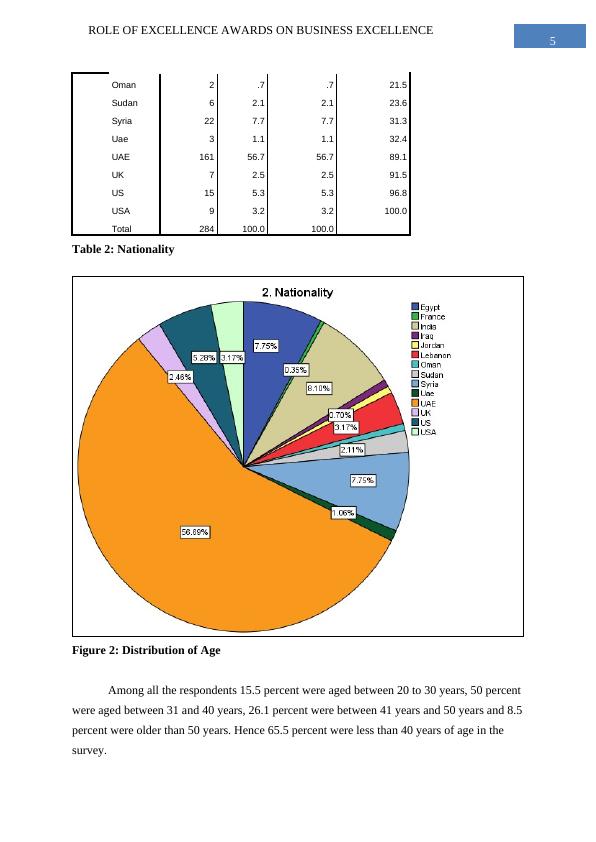
6
ROLE OF EXCELLENCE AWARDS ON BUSINESS EXCELLENCE
3. Current Age
Frequency Percent Valid Percent Cumulative
Percent
Valid
20 -30 44 15.5 15.5 15.5
31-40 142 50.0 50.0 65.5
41-50 74 26.1 26.1 91.5
More than 50 24 8.5 8.5 100.0
Total 284 100.0 100.0
Table 3: Age of respondents
Figure 3: Distribution of Age
ROLE OF EXCELLENCE AWARDS ON BUSINESS EXCELLENCE
3. Current Age
Frequency Percent Valid Percent Cumulative
Percent
Valid
20 -30 44 15.5 15.5 15.5
31-40 142 50.0 50.0 65.5
41-50 74 26.1 26.1 91.5
More than 50 24 8.5 8.5 100.0
Total 284 100.0 100.0
Table 3: Age of respondents
Figure 3: Distribution of Age
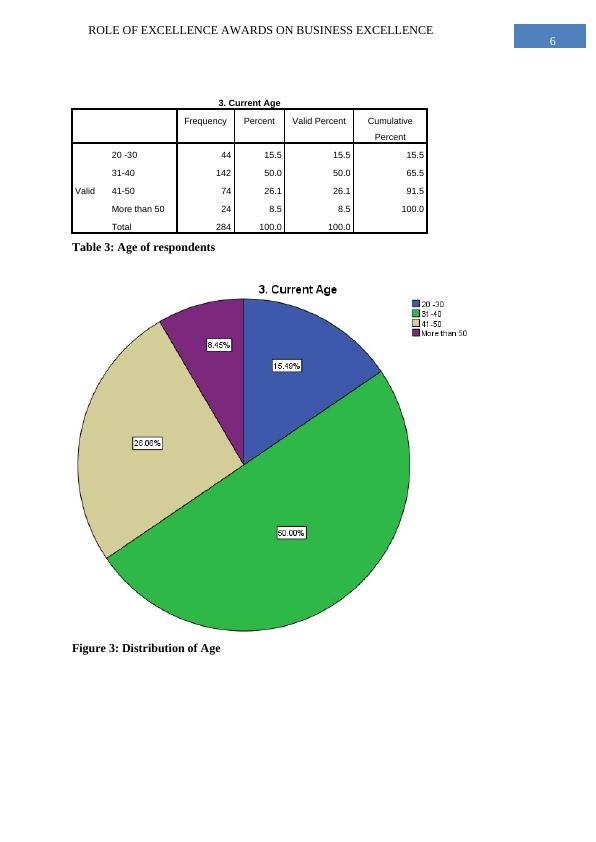
7
ROLE OF EXCELLENCE AWARDS ON BUSINESS EXCELLENCE
The survey found that 37.3 percent of the respondents had at most a Bachelors
Degree, 14.1 percent had at most a Doctorate degree, 44.7 percent were at most graduates
with Master degree and only 3.9 percent were just high school graduates. The sample thus
consists of mostly highly educated individuals.
4. Educational Level
Frequency Percent Valid Percent Cumulative
Percent
Valid
Bachelor degree 106 37.3 37.3 37.3
Doctorate degree 40 14.1 14.1 51.4
High School 11 3.9 3.9 55.3
Master degree 127 44.7 44.7 100.0
Total 284 100.0 100.0
Table 4: Qualification
Figure 4: Distribution of Education Category
ROLE OF EXCELLENCE AWARDS ON BUSINESS EXCELLENCE
The survey found that 37.3 percent of the respondents had at most a Bachelors
Degree, 14.1 percent had at most a Doctorate degree, 44.7 percent were at most graduates
with Master degree and only 3.9 percent were just high school graduates. The sample thus
consists of mostly highly educated individuals.
4. Educational Level
Frequency Percent Valid Percent Cumulative
Percent
Valid
Bachelor degree 106 37.3 37.3 37.3
Doctorate degree 40 14.1 14.1 51.4
High School 11 3.9 3.9 55.3
Master degree 127 44.7 44.7 100.0
Total 284 100.0 100.0
Table 4: Qualification
Figure 4: Distribution of Education Category
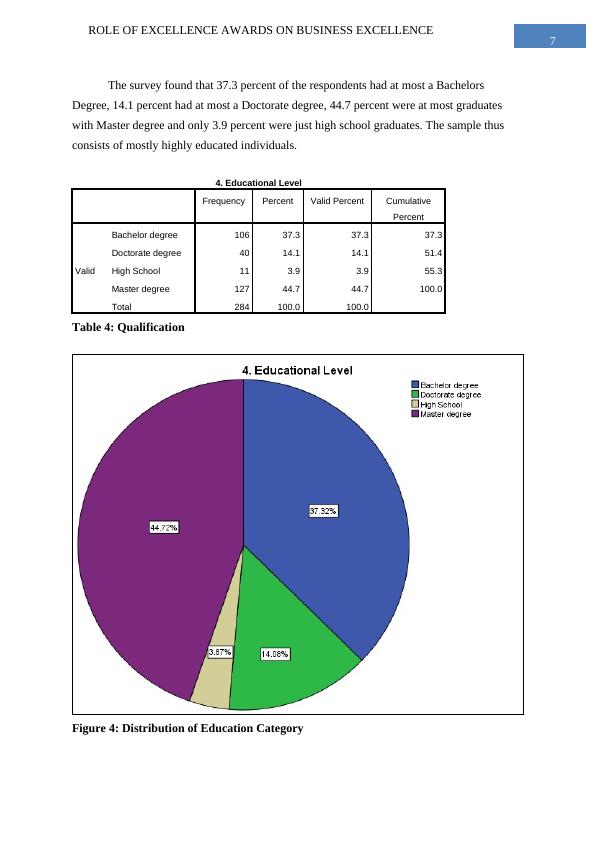
8
ROLE OF EXCELLENCE AWARDS ON BUSINESS EXCELLENCE
Among all the responses, 19 percent reported that they were junior employees, 22.2
percent said that they were employed at lower management. 14.1 percent were at middle
management, 35.9 percent were senior employees and 8.8 percent reported that were at the
top management level. Therefore it is seen that most of the responses are from the lower
levels and that suits the study fine.
5. Job Level
Frequency Percent Valid Percent Cumulative
Percent
Valid
Junior Employee 54 19.0 19.0 19.0
Lower Management 63 22.2 22.2 41.2
Middle Management 40 14.1 14.1 55.3
Senior Employee 102 35.9 35.9 91.2
Top Management 25 8.8 8.8 100.0
Total 284 100.0 100.0
Table 5: Job Level
ROLE OF EXCELLENCE AWARDS ON BUSINESS EXCELLENCE
Among all the responses, 19 percent reported that they were junior employees, 22.2
percent said that they were employed at lower management. 14.1 percent were at middle
management, 35.9 percent were senior employees and 8.8 percent reported that were at the
top management level. Therefore it is seen that most of the responses are from the lower
levels and that suits the study fine.
5. Job Level
Frequency Percent Valid Percent Cumulative
Percent
Valid
Junior Employee 54 19.0 19.0 19.0
Lower Management 63 22.2 22.2 41.2
Middle Management 40 14.1 14.1 55.3
Senior Employee 102 35.9 35.9 91.2
Top Management 25 8.8 8.8 100.0
Total 284 100.0 100.0
Table 5: Job Level
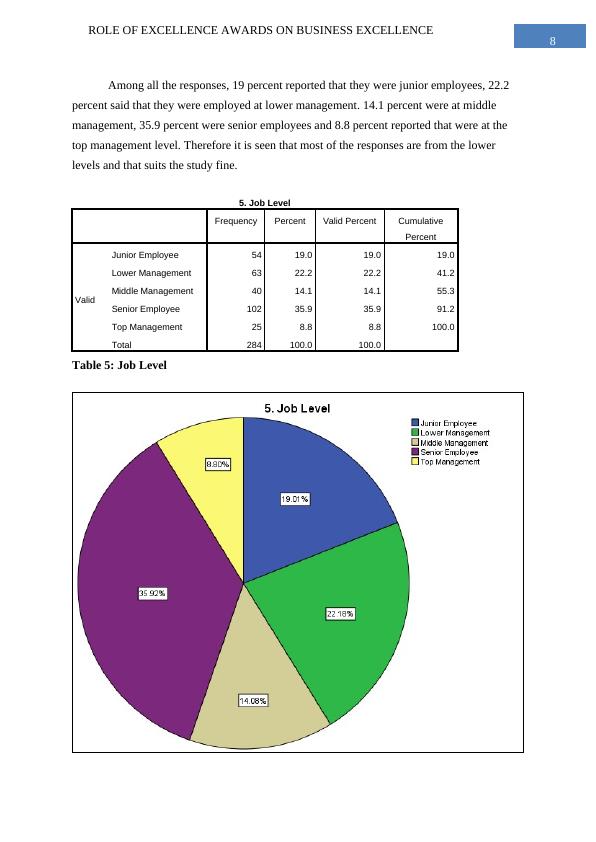
End of preview
Want to access all the pages? Upload your documents or become a member.
Related Documents
Financial Statistics: Relationship Between Variables and Income Levellg...
|16
|2280
|65